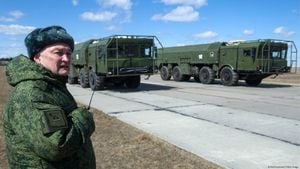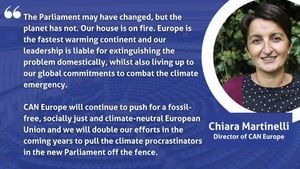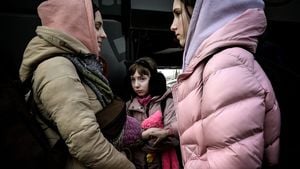Ukraine's cultural identity is caught up in the tidal wave of political and religious influences, particularly amid its current conflict with Russia. Understanding this nuanced relationship reveals much about how cultural pride and national identity are intertwined with both political decisions and religious narratives defining the Ukrainian people today.
The war with Russia has stimulated significant cultural discourse within Ukraine, grappling with the legacy of its past and the vision for its future. Cultural Minister Mykola Tochytskyi recently underscored the importance of culture as part of Ukraine's EU membership discussions. "Culture should become an integral part of such the negotiation process," he stated following discussions with European officials, emphasizing the distinctive character of Ukrainian heritage, and how it shapes national conversations as well as international dialogues.
The idea of culture as both protective and unifying resonates particularly strongly now, as the country faces external aggression. The statistics are alarming: over 1,222 cultural heritage sites have been impacted by the conflict. Amid such losses, the Ukrainian government has sought to reinforce the significance of cultural preservation. The conversation around rights to cultural expressions and the consequences of warfare on these aspects are taking precedence more than ever.
Meanwhile, the Russian Orthodox Church has become quite the contrasting narrative. Patriarch Kirill, head of the Russian Orthodox Church, has emerged as one of the staunchest defenders of Vladimir Putin's actions during the war, referring to the military conflict as "a holy war" and asserting the notion of sacrificing one’s life for the Russian motherland as redemptive. This characterization ties directly back to Russia's historical and religious ideologies, proposing unity under the guise of spirituality—something critics argue clouds the true nature of the geopolitical realities.
The intertwining of spirituality and political doctrine creates complex narratives on both sides of the conflict. The Ukrainian clergy, particularly from the Orthodox Church of Ukraine, often find themselves at odds with this narrative, highlighting their desire for independence not only as people but as cultured humans without the overshadowing influence of the Kremlin. Within this dichotomy lies the core struggle for the hearts, minds, and cultural truths of the Ukrainian populace.
One cannot ignore the importance of media freedom as well. Minister Tochytskyi and European Commissioner Marta Kos discussed the delicate balance between curbing hostile disinformation campaigns and safeguarding freedom of speech. "The issues of media freedom in wartime are not simple," he noted. Striking this balance has been fundamental to maintaining cultural integrity nationwide, leading the government to allocate significant budget increases for public broadcasters—demonstrative of their commitment to enhancing quality local narratives.
This topic finds itself deeply connected to larger conversations about how Ukrainian identity is showcased on global stages. The war has inevitably led to the rise of Ukrainian art, literature, and cultural expressions highlighted across European forums. Works of Ukrainian literature are gaining recognition even beyond borders, serving not only as artistic expressions but as platforms for resistance and unity.
The power of culture stands on the brink of transformation. Kiev's cultural scene, including the resilience of art exhibitions and theater productions, showcases stories derived from lived experiences of the war, fostering dialogue around loss, recovery, and strength. Museums and galleries across Ukraine comprise testimonies of survival and hope, embodying the spirit of resilience among the population.
Simultaneously, young Ukrainian artists have been vocal in their criticism against global brands and Western institutions, urging them not to overlook the realities of the Ukrainian struggle. Calls for responsible representation resonate through social media, capturing the urgency for change and equity for war-affected societies.
Political landscapes, too, intersect deeply with cultural ambitions. President Volodymyr Zelensky has rallied for international support to craft and implement effective cultural policies throughout Ukraine. His vision entails establishing what some refer to as "cultural Ramstein"—forming collaborative ties with allies to promote Ukrainian culture and heritage globally, showcasing its resilience through artistic platforms and concerts, even amid conflict.
This cultural revival and political ambition convey the message: Ukraine's identity isn’t just written within its borders; it extends outward as part of European consciousness, entwined with aspirations of joining the European Union. Such cultural aspirations denote not only historical acknowledgments but also the inherent human right to express and preserve one's heritage regardless of conflict.
Simultaneously, Ukrainian citizens have become increasingly engaged and vocal about cultural preservation efforts, recognizing their role as custodians of collective memory. Grassroots movements aimed at restoring damaged sites and reconstructing narratives around lost heritage are manifestations of this engagement, showcasing civilian strength and activism even amid adversity.
Moving forward, the foundations laid by cultural initiatives could prove pivotal for Ukraine's socio-political aspirations. The interplay of tradition, history, and modern political realities influences Ukraine's path both toward EU integration and cultural sovereignty. The narrative continues to evolve, showcasing not only the preservation of culture but the resiliency and adaptability of the Ukrainian people, grounded firmly by their heritage.
Indeed, the road to recovery—both cultural and political—will be long and fraught with challenges requiring concerted community effort, international support, and above all, the unwavering spirit of the people. The story of Ukraine becomes one not merely of conflict but of resurgence, identity, and the quiet, resilient power of cultural expression.



